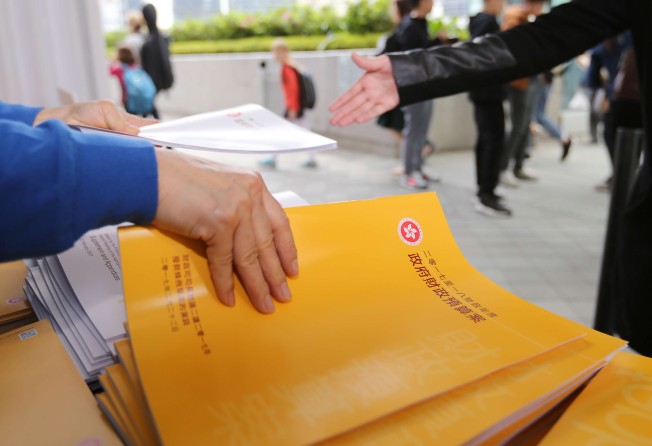Latest budget takes a small step in the right direction
Financial Secretary Paul Chan is right to invest in the future but more thought needs to be given to how best to spend our surpluses and HK$1 trillion reserves

In delivering the latest budget, new Financial Secretary Paul Chan Mo-po has offered some good soundbites. Whether they will translate into a more tangible budgeting reform is a key question for the next government.
But at least Chan has identified the key shortcomings of his predecessor and chief executive candidate John Tsang Chun-wah. He says the government needs to project more accurate revenue forecasts, rethink the accumulation of excess revenue, and make better use of surpluses.
While he still stuck to handing out one-off “sweeteners”, he hinted at greater financial commitment to longer-term social investment and recurrent spending.
The most eye-catching aspect of the budget was Chan’s promise to spend HK$61 billion – or 65 per cent of the last financial year’s surplus of HK$92.8 billion – on services for the elderly and the disabled, sports, innovation and technology, and youth development. That’s far better than stashing it away into the so-called Future Fund, one of Tsang’s babies that basically means locking away the money for unspecified periods and purposes. It would be even better if Chan were to eliminate the pointless fund completely.
More of the new spending should have been made recurrent if those social and economic services are to pay off.
It makes far more sense to invest in long-term health care and pensions than wasting more money on one-off giveaways. Disappointingly, about HK$35 billion – or more than half of the new financial commitment – will be for one-off reduction in taxes, a waiver of rates for four quarters, and an extra one-month allowance for welfare recipients.
That is too timid. The HK$92.8 billion surplus is almost twice the HK$50 billion set aside for a new voluntary health insurance. Compared to this, the government is ever generous in budgeting HK$100 billion for large infrastructure projects for the next financial year, the kind of investment favoured by the administration but which as a developed economy, we increasingly outgrow.
Meanwhile, the next government must stop Tsang’s practice of crying wolf of being poor, only to disclose an embarrassment of riches at the next budget.
Getting more accurate budget forecasts will be a start. Bearing in mind that our fiscal reserves are approaching HK$1 trillion, we need smarter ministers to know how to spend it wisely for the people, to lessen social discontent and soften conflicts.